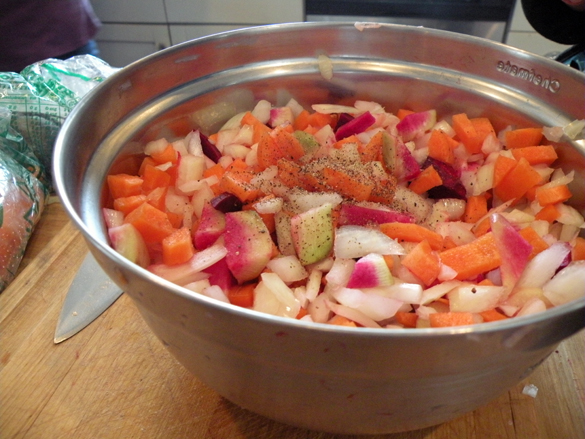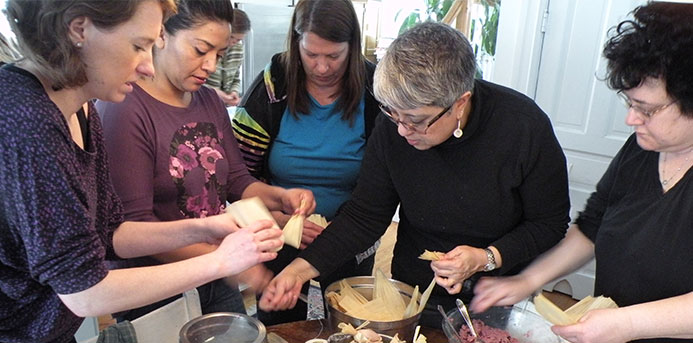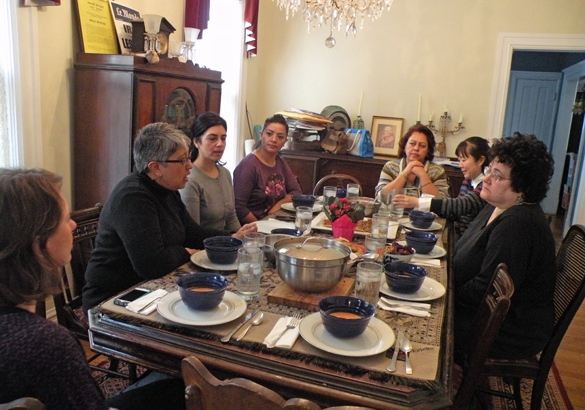It started with a bag of beets, the vibrant juices staining fingertips and wooden chopping blocks crimson.
Next came a handful of plump carrots, julienned to delicate matchsticks. Potatoes, radishes and onions, fresh pressed tomato sauce and homemade sausage were then chopped, minced, sautéed and browned, creating a colorful and fragrant feast. In a small kitchen in Evanston, each stovetop coil occupied and the oven humming determinedly, pots and pans brimmed with fresh ingredients and inspiration.
Two Fridays each month in a family kitchen on the North Shore, something beautiful comes to life. The group size varies—anywhere from six to 13—and the women in attendance have roots ‘round the world. And together, drawing from their unique perspectives, they create and share a flavorful meal from fresh local ingredients to disprove an old adage: There’s no such thing as too many cooks in the kitchen.
For this convivial sisterhood of culinary novices, global action starts in the kitchen. Within their group—Eating Locally, Acting Globally, a program of Open Communities—the women practice gastronomic innovation. They promote sustainable agriculture, exchanging ways to eat healthy, locally grown foods in season. More importantly, they gather to share the stories and recipes from their varied cultural backgrounds, promoting inclusivity in an environmentally healthy community.
Lali Watt, who organizes the program with Open Communities’ Immigrant Leadership Project Director Alicia De La Cruz of Highland Park, immigrated to the United States at age 21. Originally from India by way of Europe, the Wilmette resident long had an interest in food, cooking, sustainability and agriculture. With an acute awareness of how much better it is to eat locally with adherence to seasonal offerings, Watt submitted a proposal for a local women’s cooking group and received fundraising from the Sally Mead Hands Foundation. The women hosted their first cooking session together in September.
“So often when we do projects, they’re about one group teaching another group,” Watt says. “I’d always had a dream that we could learn from each other, as peers. If we took a bunch of women, none of whom are professional cooks, but all of whom have a real interest in food, and brought them together, good things would happen.”
 Each session begins with the presentation of an ingredient box from Tomato Mountain, a community-supported agriculture (CSA) farm in Brooklyn, Wis. Alive with the colors of the season, the freshest organic produce serves as the creative spark for the day’s activities. Each box differs slightly from the last, depending on the availability and the ingredients of the season. Sometimes there’s a protein, fresh chicken or sausage, but more often than not, the box is replete with organic vegetables and grains. The task at hand—to make a meal for this group of women to share—requires a steady hand and a creative mind, and this group is always game.
Each session begins with the presentation of an ingredient box from Tomato Mountain, a community-supported agriculture (CSA) farm in Brooklyn, Wis. Alive with the colors of the season, the freshest organic produce serves as the creative spark for the day’s activities. Each box differs slightly from the last, depending on the availability and the ingredients of the season. Sometimes there’s a protein, fresh chicken or sausage, but more often than not, the box is replete with organic vegetables and grains. The task at hand—to make a meal for this group of women to share—requires a steady hand and a creative mind, and this group is always game.
“This group gives you the courage to actually try new things,” says Renee Weber of Evanston.
“This is a great exercise in looking at what you have,” adds Leslie Harris, a college professor living in Glenview. “It’s a cooperative experiment in figuring out what to make.”
There’s a feeling of organized chaos, with women dipping around each other between counters and tables, the synchronized choreography gained only from familiarity with a kitchen space. There’s a spirit of, “Yes!” that leads to a magical collaboration.
“Recipes just unfold in front of you,” says Saima Abbasi of Wilmette, who hails from Pakistan. “It’s part of the synergy of the group.”
 The resultant dishes, made from recipes both spontaneous and learned, run the gamut, each more colorful and fragrant than the last: onion tart, vegetable calzones, empanadas, raspberry tamales, beet salad. None of the women are professional chefs, but all are connected by their passion for food. They draw from their backgrounds, from recipes learned in their youth and culled from their experience, to create delicious combinations.
The resultant dishes, made from recipes both spontaneous and learned, run the gamut, each more colorful and fragrant than the last: onion tart, vegetable calzones, empanadas, raspberry tamales, beet salad. None of the women are professional chefs, but all are connected by their passion for food. They draw from their backgrounds, from recipes learned in their youth and culled from their experience, to create delicious combinations.
What is gained, in addition to a full stomach, is a deeper understanding of each other’s cultures.Liliana Salcido of Skokie, originally from Mexico, is improving her English through interactions with the group, while others are improving their skills by working around dietary restrictions (one woman keeps Kosher, another Halal). The group even took a field trip in February to H Mart, an Asian grocery superstore in Niles, where Qingyan Deng of Winnetka, who immigrated from China, led a tour, recommending unique ingredients for later use.
The women of Eating Locally, Acting Globally celebrate their communion over a grand lunch, sharing conversation about religion, tradition, ethnicity and feminism. The experiment has expanded the worlds of its participants, teaching the women to be “flexible, not so neurotic,” Weber says. “Cooking with a bunch of women is like therapy.”
It’s a lesson we can all learn from; next time you find yourself at a loss for what to prepare for dinner, take what you already have and embrace the mantra of the group: Just go for it.


